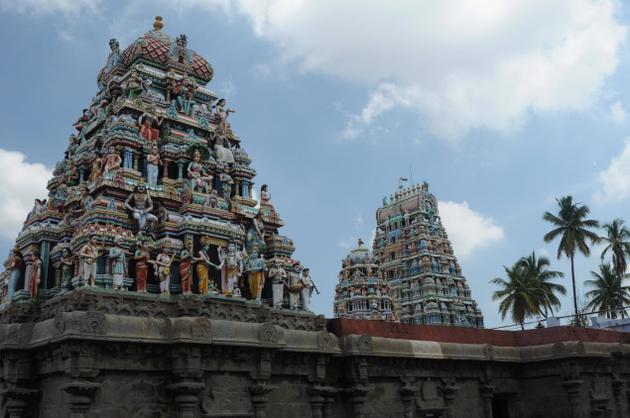The Avinashi Temple is devoted to Lord Shiva and is located in Avinashi town. This temple is believed to have been built by Sundarapandiya and is closely linked with Sundaramoorthy Nayanar, a great Shiva Saint. The site derives its name from the word Avinashi, meaning indestructible.
Lord Kaala Bhairavar is the main deity, to whom offerings are made in the form of Vadai Maalai. This temple is popularly known as the Karunaiyaaththaal Temple and is one of the seven Thevara Stalams of Tamil Nadu. Various inscriptions have been found in this temple, stating the huge contributions made by different dynasties like the Cholas, Pandyas and Hoysalas.
The Ambal's sanctum, Avinasiappar's sanctum, Kasi Gangai Theertham and shrine dedicated to Kaalabhairavar are situated within the premises of this temple. The car festival, Arubathi Moovar Ula, and the annual Bhrammotsavam are the major festivals celebrated in this temple.
The shrine of Goddess Karunambikai (consort of Avinashi Lingeswarar) is seen separately and is located on the right side of the presiding deity. It is located in the southern side of the temple corridor.
Arulmighu Avinasiappar Temple is located in Avinashi Tiruppur .This Temple is a Hindu Temple Dedicated to Lord Shiva in the form of swayambumurthy and is one among 275 Shiva Sthalams.
Devotees visit this temple to get relief from evil effect , fear of death , snake effect.Meaning of Avinashilingam. Vinasha means destruction. Avinashi means prevention of destruction and ensuring eternity.This is the first Lord Shiva temple in Kongunadu region praised in Thevaram hymns.
The Tamil saying goes Kasiyil Vasi Avinashi meaning that what the devotee derives by worshipping in Kasi-Varanasi, he/she derives half of the benefits by worshipping Avinashilingeswara in Avinashi.
Lord Avinashi Appar, Lord Bhairava and the holy water-theertham are brought from Kasi. Lord Bhairava in this temple is one among the 64 Bhairava forms.
Bathing in the Kasi well in the temple on new moon day Amavasya brings manifold benefits to the devotee.
There will be no interval closing of the temple on new moon days.
There are two Ambikas in the temple, one in penance and the other with Lord in the sanctum sanctorum. The temple is sung by Saint Manicka Vasagar in his celebrated Tiruvasagam hymns.
Avinashiappar is believed to be elder to Kasi Bhairava known as Akasha Kasikapura Pruradhanadha Bhairava in a shrine in the prakara.The Kaalabhairavar shrine in this temple is held in reverence. Kaala Bhairavar is worshipped here with offerings of Vadai Maalai.
Avinashiappar temple is a protected monument under the Archeological survey of India.
Do:
- Do pray your Ishta Devata before pilgrimage to Temple.
- Do contact Temple Devasthanam information centre for enquiry, temple information and for Pooja details etc.
- Do reserve your travel and accommodation at Temple well in advance.
- Do bath and wear clean clothes before you enter the temple.
- Do concentrate on God and Goddess inside the temple.
- Do maintain silence and recite Om Namahsivaya or your Istamantram to yourself inside the temple.
- Do observe ancient custom and traditions while in Temple.
- Do respect religious sentiments at Temple.
- Do deposit your offerings in the hundi only.
Dont's:
- Do not come to Temple for any purpose other than worshipping of God and Goddess.
- Do not smoke at Temple.
- Do not consume alcoholic drinks at Temple.
- Do not eat non-vegetarian food in the Kshetram.
- Do not approach mediators for quick Darshanam. It may cause inconvenient to others.
- Do not carry any weapon inside the temple.
- Do not wear any head guards like helmets, caps, turbans and hats inside the temple premises.
- Do not perform Sastanga Pranama inside the Sanctum Sanctorum.
- Do not take much time while performing Sparsa Darshanam to God in Garbhagriha.
- Do not buy spurious prasadams from street vendors.
- Do not encourage beggars at Temple.
- Do not spit or create nuisance in the premises of the temple.
